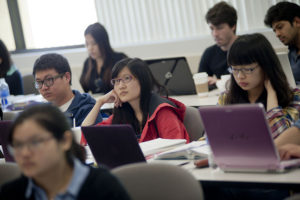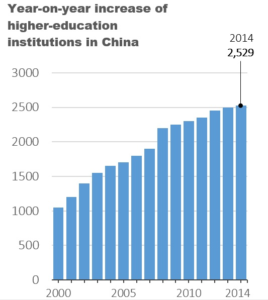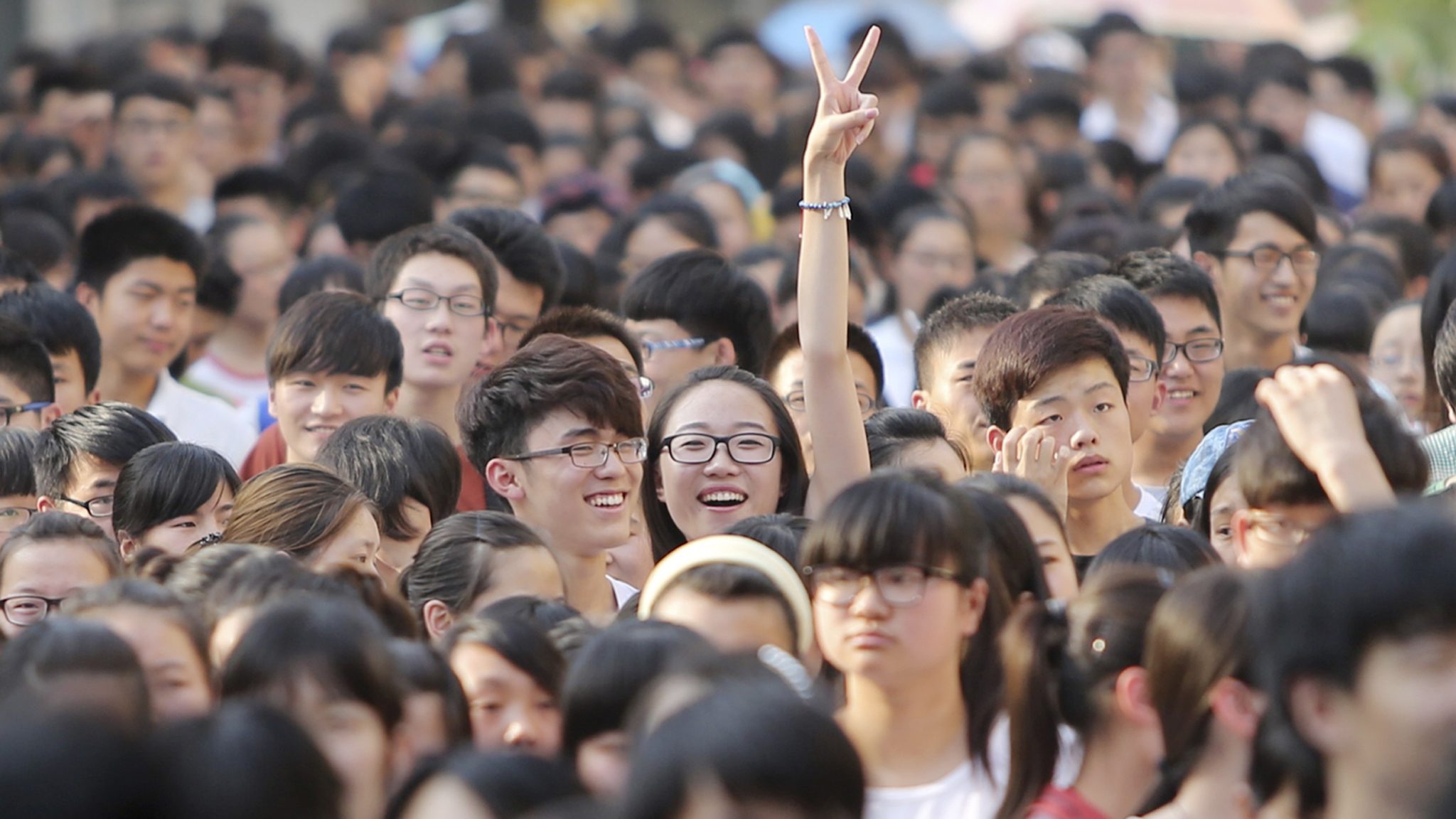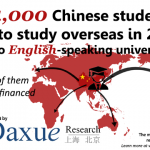Will the Rise of the Chinese Universities bring Chinese Millennials Back Home?
There has been a shift in the balance of scales of higher education from the West to the East. Asian universities increased from holding just 8 spots to 18 in 2015 on World University League tables published by the Times newspaper. Hong Kong, Japan, and Singapore are major contributors to this, as well China. In particular, Tsinghua and Peking Universities have climbed the rankings to become top 50 world universities. The rise of Chinese Universities onto the world stage can be attributed to intensive spending on a selective few institutions (around 100) through government initiatives such as projects 211 and 985 with the aim to recover damage from the Cultural Revolution. The rise of a select few Chinese Universities has been at the expense of the other two thousand or higher education institutions in China. One Principle of a southern Chinese University made headlines when he revealed Zhejiang University receives more funding in three months than his school had received in 63 years.
It is no surprise then that many Chinese students are studying abroad. There are around 19 Chinese students studying in the United States for everyone U.S student studying in China. Chinese students makeup something around 30% of the global student population studying abroad, and has an outward mobility of around 2% – relatively high for such a big nation (the U.S. has 0.3% in comparison).

Chinese Students make up 31% of International students in the United States
Why are Millennials choosing to study abroad?
Generally, it is Millennial’s families that have the say in where they study. But it is not just wealthy families sending their millennial children abroad; many middle-class parents are also choosing to do so. A poll by 51jobs.com in Shanghai found:
“Of the 607 parents who took part in the survey, 76.8% responded that they plan to send their children to study overseas even if the cost of tuition and living expenses may reach 1 million Yuan (US $163,111).”
Xuran Peng, a Chinese student in the US interviewed by BBC News, said her parents view her education as an investment that will benefit her entire family. This is despite Chinese millennials underperforming at British universities compared to their British counterparts, and over 8000 being expelled from US universities in 2014.
Millennials are embracing their parent’s openness to send them abroad. For both millennials and parents, there are some factors influencing their views.
Foreign Education (supposedly) Leads to Better Jobs
Young Chinese people are pushed to become career oriented from an early age, and millennials are no different. Having a stamp of approval from a large, recognized institution is thought to lead to a better job – whether this is true is up for debate. Either way studying abroad, especially in the West on English-taught programs, improves English language skills and provides an international outlook, skills which can make Chinese students highly employable. This is a better prospect than the perception that Chinese millennials have of their domestic institutions, which are seen to churn out ill-equipped graduates with bleak earnings potential. For local students, average earnings for university graduates leaving school have been reported to be around just 3500 RMB, similar to what a migrant construction worker makes.
Escaping The Pressure of Chinese Higher Education
The intense competition to enter the small number of top institutions in China puts immense pressure on Chinese students. Chinese education has a strong reputation for its mechanical learning regime. The Chinese equivalent to the SAT, the gaokao (高考), pivots around memorization of Chinese history and culture facts. Even a high-performing student in one school will be facing competition from thousands of others of a similar level. As a result, the immense pressure gets put on millennials by their families out of a desire to secure them one of the very limited white collar jobs.
Freedom to be an individual
Chinese millennials want to be individuals. The growth and popularity of niche fashion brands serve as an example of this. In this regard, domestic public universities offer millennials a very bleak outlook. Students commonly have to take mandatory classes on Marxist and military theory. Chinese universities again focus on memorization and less on creative learning. The academic culture discourages millennials from standing out when they increasingly desire to. Campus life can be heavily regimented, and each public funded school is required to have a communist party committee. Universities abroad comparatively look like beacons of freedom for Chinese millennials who want to express themselves– this is a generation that has grown up around technology, or if born earlier, exposed to technology at a later stage. One student, Junfeng Guan interviewed forBBC News turned down an offer at a University in Shanghai to study in the US offered him freedom to choose his focus of study.

Dormitory building at Yangzhou University
The Chinese Brain Drain
“The kids who have the best memory and ability to conform to the system succeed, but their number one quality is an ability to take orders and be micromanaged.” – Jiang Xueqin, Harvard University Global Education Innovation Initiative Researcher.
China’s education system was a good fit during its ‘sweatshop economy’ days, where engineers and mid-level bureaucratic managers could be produced by identifying those with the highest analytical abilities, writes Jiang Xueqin, Yale alumnus, a researcher at Harvard University, and who pioneered new education styles in Chinese schools. As China transitions to a consumerist, white collar economy, its education system will have to change along with this, and despite the lack of white collar jobs to keep up with China’s development, the higher education system is simply not adapting fast enough.
For the brightest Chinese students, studying abroad offers the academic freedom and opportunities to become higher tier leaders and managers in other countries. While recently there has been an increase in the number of Chinese students who study abroad and return to China, the amount who does not return remains high:between 1978 and 2006, around 70% of students who went abroad did not return.
As well as the quality of Chinese universities, “Chinese employers know exactly what they want – someone who will do as they are told for not much money”, said Ivy Wang to BBC News, who studies a master’s degree student studying in the United Kingdom. Employers sometimes do not regard individuals who had studied abroad not as pliant as they would like. So for the brightest students why go back?
The Chinese economy may have grown to the second biggest despite this brain drain, but this will have a significant impact on China becoming a more innovation-driven economy, especially as innovation becomes more important in China’s markets, and is required for Chinese companies to compete internationally.
Additionally, most western (especially American) business leaders and politicians do not understand China. Chinese students in places like the US are well placed to increase mutual understanding. However, for China to benefit from this, students must return home. Finally, if China reforms its education system as above, more Western students will be tempted by Chinese universities further building links and understanding between the West and East.
Will Rising of Chinese Universities Affect Millennial Decisions on Education?
In short, yes, but will this be soon? Probably not. With the major increase in economic development in China, so too has the number of higher education institutions in a relatively short time-frame as shown in the graph below.

Reproduced from the Wall Street Journal, figures from China Statistical Yearbook 2015, Open Doors Report on International Educational Exchange, 2015.
While Chinese universities have indeed entered the global stage, for a nation of over 1.38 billion people, these universities represent a tiny fraction of China’s overall higher education institutions. Bringing many more Chinese universities in line with global standards will not only take time but will require a shift in Chinese educational practices at grass roots – specifically a shift from the rote mechanical learning emphasis described to one more focused on critical reasoning. Until this occurs Chinese millennials will continue to look abroad, and for those that cannot access foreign education or one of the 100 elite institutions, they will be at risk of entering an economy that they are not ready for.
The End Line
Ultimately, two underlying issues need to be resolved to change the perceptions towards Chinese education:
- Firstly, an increase in the number of globally competitive Chinese Universities outside of the 100 elite schools through increasing academic freedom, and taking an education model that is focused on critical thinking rather than mechanical, memory-based learning
- Secondly, increasing the amount of white collar opportunities that matches Chinese economic growth over the last decade
When these two issues are resolved, we will see millennials enthusiasm for domestic institutions, and retention of Chinese students, particularly the brightest young Chinese minds who go to study abroad.
If you’d like to follow our weekly updates on the China market connect with us on LinkedIn, Facebook, and Twitter.
[Photos Credits: Reuters/China Daily, Michal Czerwonka for the Wall Street Journal, Michael Ryan for the Wall Street Journal]















